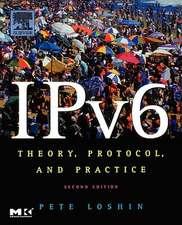Online Arab Spring: Social Media and Fundamental Change
Autor Reza Jamalien Limba Engleză Paperback – 12 dec 2014
- provides innovative interdisciplinary research, incorporating media studies, cultural aspects, identity and psychology
- presents a detailed study of factors such as national heritage, cultural homogeneity, belief system and consumer ethnocentrism
- focuses on religious attitudes in the context of online media
Preț: 301.08 lei
Preț vechi: 376.35 lei
-20% Nou
Puncte Express: 452
Preț estimativ în valută:
57.62€ • 62.57$ • 48.40£
57.62€ • 62.57$ • 48.40£
Carte tipărită la comandă
Livrare economică 15-29 aprilie
Preluare comenzi: 021 569.72.76
Specificații
ISBN-13: 9781843347576
ISBN-10: 1843347571
Pagini: 200
Dimensiuni: 156 x 234 x 10 mm
Greutate: 0.2 kg
Editura: ELSEVIER SCIENCE
ISBN-10: 1843347571
Pagini: 200
Dimensiuni: 156 x 234 x 10 mm
Greutate: 0.2 kg
Editura: ELSEVIER SCIENCE
Public țintă
Researchers and practitioners in the areas of social media and its societal implications, with a particular focus on the Middle East and contemporary social change.Cuprins
- List of figures
- List of tables
- About the author
- Acknowledgements
- Introduction
- 1. The origin of social media effects on countries' fundamental changes
- Factors promoting social media penetration
- Information literacy and media literacy
- Mono-nationality and cultural exchanges
- Soft war
- References
- Further reading
- 2. National identity, crises of legitimacy and penetration of social networks
- Socialisation and national identity
- Dimensions of national identity
- References
- Notes
- 3. Social media and social capital (with an emphasis on security)
- Security and social capital
- The role of political factors in social security
- Factors in individual decision-making at the national level
- Factors in participation in the security of society
- Actual extent of the rule of law
- References
- 4. Effects of information and media literacy in social movements
- The complexity of the media
- Literacy and political knowledge
- Information literacy education in developing countries
- Media literacy and critical thinking
- References
- Further reading
- 5. Religious attitudes in the cyber world
- Religion and media
- Islam, media and fighting oppression
- Religion and social media: a mutual relationship
- Religious democracy from a new viewpoint
- Religious meritocracy
- Islamic political parties
- References
- Notes
- 6. Country-social media intelligence: Towards a new index
- Social media intelligence
- Political market segmentation in the social media
- Message design, media selection and message sending
- Feedback and improvement on the message
- References
- Further reading
- 7. Strategic analysis and future strategies
- Introduction
- Analysis of political factors
- Analysis of economic factors
- Analysis of social factors
- Analysis of technological and technical factors
- Analysis of legal factors
- Analysis of ethical factors
- Strategies for the future
- Overall conclusion
- References
- Index






